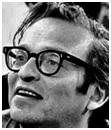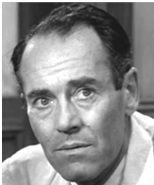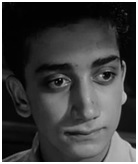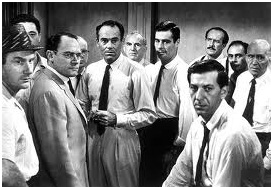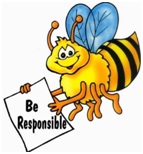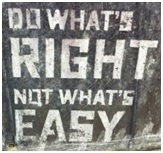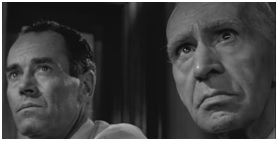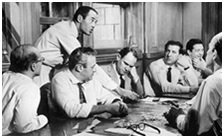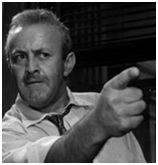|
 |
|
 |
|
|
||
Twelve Angry Men (1957)
Famous for... Henry Fonda’s performance as the leader of a twelve man jury in a murder trial, fighting for justice. Controversially he didn’t even receive an Oscar nomination. Director Sidney Lumet (pictured right) also the director of the whistle-blowing film, Serpico.
Oscars None The Bridge on the River Kwai got most of the Oscars that year.
Key character Juror 8 (Henry Fonda), leader of the jury (pictured right).
The story A poor (Puerto Rican or Hispanic) 18-year-old youth is on trial in a New York court for murdering his father with a knife. If found guilty, he (pictured right) will be executed by the electric chair. He says he is innocent, because:
After the six day trial, the twelve man, all white jury (pictured right below) retires to consider
their verdict, having been reminded by the judge that the boy must be found innocent, if there is any
reasonable doubt about his guilt. On a boiling hot day all the jurors vote for his conviction except Juror 8, an architect (later called Davis), who persuades his weary colleagues to re-examine the evidence. His defence of the accused drags on into an even hotter night. He gradually wins the others over until they unanimously vote for a not guilty verdict.
Lessons for ethics and leadership
1. We have a duty to
others The jury has someone’s life in their hands but only Juror 8:
The others show how easy it is to be lazy, indifferent and unloving to others, particularly if they come from a poor ethnic minority like the boy charged with murder. Juror 7 (a salesman) is more anxious about seeing an evening baseball game. Juror 12 is more concerned about his career in advertising. 2. Stand up for what is right Juror 8:
The boy:
Juror 11 asks Juror 7: “Don't you have the guts to do what you think is right?”
3. Seek the truth Juror 8 is a hero, because he:
4. Integrity inspires The other jurors are won over by Juror 8’s:
This makes him the jury’s leader, even though he’s not their appointed leader (see point 5).
5. Power beats
position Juror 1 is chosen as foreman to lead the jury, but Juror 8 (pictured right) becomes the real leader through his:
6. Beware of arrogant prejudice The last juror to be won over (Juror 3, Lee J. Cobb, pictured right) runs a messenger business. He is:
Juror 10 thinks he's guilty only because he is
7. Accept your own ignorance Juror 8 is a hero because he convinces the others to humbly accept that they may be wrong. Juror 9 (the first person to support him) tells Juror 10 : “Do you think you were born with a monopoly on the truth?”
8. Be empathetic and kind Juror 8 tells the others to see the case from the charged man's point of view. He asks Juror 6: “Suppose you were the one who was on trial?” Juror 8 acts with kindness as well as tough resolution. After the final unanimous verdict, he helps Juror 3 (his violent adversary) on with his jacket, when he is upset about his son.
9. We are all capable of greatness Juror 8 was an ordinary guy (an architect called Davis) who did something extraordinary - he saved someone's life by the power of persuasion.
Key quotes on law and ethics It’s not easy to raise my hand and send a boy off to die without talking about it first, Juror 8 . Don't you have the guts to do what you think is right?, Juror 11 (to Juror 7)
Key quote on wisdom Prejudice always obscures the truth, Juror 8. Do you think you were born with a monopoly on the truth?, Juror 9 (to Juror 10)
Key quote on influencing people It's not easy to stand alone against the ridicule of others, so he gambled for support - and I gave it to him. I respect his motives, Juror 9 (talking about Juror 8)
Two film websites to recommend 1. filmsite.org (run by Tim Dirks). 2. aveleyman.com (run by Tony Sullivan) |
|
|
||
|
|
||
| Copyright © wisdomtowin.com 2025 All Rights Reserved | ||
|


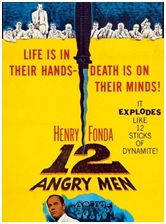 Twelve Angry Men - Ethics and Leadership
Twelve Angry Men - Ethics and Leadership